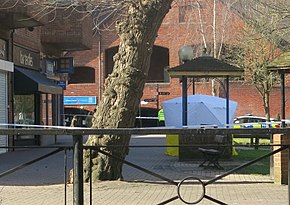
Back تسمم سيرغي ويوليا سكريبال Arabic Атручэньне Скрыпалёў BE-X-OLD Отравяне на Сергей и Юлия Скрипал Bulgarian Otrava Sergeje a Julije Skripalových Czech Fall Skripal German Υπόθεση δηλητηρίασης του Σεργκέι και της Γιούλια Σκριπάλ Greek Envenenamiento de Serguéi y Yulia Skripal Spanish Sergei ja Julija Skripali mürgitamine Estonian Sergei ja Julija Skripalin myrkytystapaus Finnish Empoisonnement de Sergueï et Ioulia Skripal French
| Poisoning of Sergei and Yulia Skripal | |
|---|---|
 A forensics tent covers the bench in Salisbury where Sergei and Yulia Skripal fell unconscious | |
| Location | Salisbury, Wiltshire, United Kingdom |
| Date | 4 March 2018 |
| Target |
|
| Weapons | A-234 (suspected chemical weapon used) |
| Victims | 3 admitted to hospital (subsequently discharged): Sergei and Yulia Skripal Detective Sgt Nick Bailey (Wiltshire Police) |
| Accused |
|
The poisoning of Sergei and Yulia Skripal, also known as the Salisbury Poisonings, was a botched assassination attempt to poison Sergei Skripal, a former Russian military officer and double agent for the British intelligence agencies in the city of Salisbury, England on 4 March 2018.[5][6] Sergei and his daughter, Yulia Skripal, were poisoned by means of a Novichok nerve agent.[7] Both spent several weeks in hospital in a critical condition, before being discharged. A police officer, Nick Bailey, was also taken into intensive care after attending the incident, and was later discharged.[8][9][10][a]
The British government accused Russia of attempted murder and announced a series of punitive measures against Russia, including the expulsion of diplomats. The UK's official assessment of the incident was supported by 28 other countries which responded similarly. Altogether, an unprecedented 153 Russian diplomats were expelled by the end of March 2018.[12] Russia denied the accusations, expelled foreign diplomats in retaliation for the expulsion of its own diplomats, and accused Britain of the poisoning.[13]
On 30 June 2018, a similar poisoning of two British nationals in Amesbury, seven miles (11 km) north of Salisbury, involved the same nerve agent.[14][15] Charlie Rowley found a perfume bottle, later discovered to contain the agent, in a litter bin somewhere in Salisbury and gave it to Dawn Sturgess who sprayed it on her wrist.[16][17] Sturgess fell ill within 15 minutes and died on 8 July, but Rowley, who also came into contact with the poison, survived.[18] British police believe this incident was not a targeted attack, but a result of the way the nerve agent was disposed of after the poisoning in Salisbury.[19] A public inquiry was launched into the circumstances of Sturgess's death.[20] On 5 September 2018, British authorities identified two Russian nationals, using the names Alexander Petrov and Ruslan Boshirov, as suspected of the Skripals' poisoning,[2] and alleged that they were active officers in Russian military intelligence.[21] Later, investigative website Bellingcat stated that it had positively identified Ruslan Boshirov as being the highly decorated GRU Colonel Anatoliy Chepiga,[22] that Alexander Petrov was Alexander Mishkin, also of the GRU,[23][24] and that a third GRU officer present in the UK at the time was identified as Denis Vyacheslavovich Sergeev,[25][26] believed to hold the rank of major general in the GRU. The pattern of his communications while in the UK indicates that he liaised with superior officers in Moscow.[27]
The attempted assassination and subsequent agent exposures was an embarrassment for Putin and for Russia's spying organisation.[5][28] It was allegedly organised by a secret Unit 29155 of the Russian GRU under command of Major General Andrei V. Averyanov.[29] On 27 November 2019, the Organisation for the Prohibition of Chemical Weapons (OPCW) added Novichok, the Soviet-era nerve agent used in the attack, to its list of banned substances.[30]
- ^ Second Skripal Poisoning "Suspect Identified as Dr. Alexander Mishkin" Archived 9 October 2018 at the Wayback Machine, Bellingcat.com. 8 October 2018. Retrieved 9 October 2018.
- ^ a b "Salisbury Novichok poisoning: Two Russian nationals named as suspects". BBC News. 5 September 2018. Archived from the original on 5 September 2018. Retrieved 5 September 2018.
- ^ "Skripal suspect 'was made Hero of Russia' by President Putin". BBC News. 26 September 2018. Archived from the original on 27 September 2018. Retrieved 26 September 2018.
- ^ "Salisbury poisonings: Third man accused by police of Novichok attack". BBC News. 21 September 2021. Archived from the original on 21 September 2021. Retrieved 21 September 2021.
- ^ a b Harding, Luke (23 June 2020). "A chain of stupidity': the Skripal case and the decline of Russia's spy agencies". The Guardian. Archived from the original on 5 July 2020. Retrieved 25 August 2023.
- ^ Dodd, Vikram; Harding, Luke; MacAskill, Ewen (8 March 2018). "Sergei Skripal: former Russian spy poisoned with nerve agent, say police". The Guardian. Archived from the original on 7 April 2018. Retrieved 8 March 2018.
- ^ Asthana, Anushka; Roth, Andrew; Harding, Luke; MacAskill, Ewen (12 March 2018). "May issues ultimatum to Moscow over Salisbury poisoning". The Guardian. Archived from the original on 4 June 2019. Retrieved 13 March 2018.
- ^ Hudson, Rebecca. "Police officer in hospital after Russian Spy nerve agent attack named as award-winning Detective Sergeant Nick Bailey". Salisbury Journal. Archived from the original on 22 August 2018. Retrieved 21 June 2020.
- ^ Cite error: The named reference
dischargedwas invoked but never defined (see the help page). - ^ "Russian spy: What we know so far". BBC News. 5 April 2018. Archived from the original on 31 May 2019. Retrieved 6 April 2018.
- ^ Simpson, John; Haynes, Deboarh (16 March 2018). Hamilton, Fiona (ed.). "Russia: Salisbury poison fears allayed by doctor". Archived from the original on 4 June 2019. Retrieved 29 March 2018.
- ^ Chughtai, Petkova; Chughtai, Alia (3 April 2018). "Skripal case diplomatic expulsions in numbers". Al Jazeera. Archived from the original on 3 August 2019. Retrieved 8 April 2018.
- ^ Dearden, Lizzie (2 April 2018). "Russia claims it could have been in interests of Britain to poison Sergei Skripal". The Independent. Archived from the original on 5 July 2020. Retrieved 3 April 2018.
- ^ "Wiltshire pair poisoned by Novichok nerve agent". BBC News. 4 July 2018. Archived from the original on 4 July 2018. Retrieved 5 July 2018.
- ^ "Two collapse near spy poisoning site". BBC News. 4 July 2018. Archived from the original on 4 July 2018. Retrieved 5 July 2018.
- ^ Morris, Steven; Rawlinson, Kevin (24 July 2018). "Novichok victim found substance disguised as perfume in sealed box". The Guardian. Archived from the original on 25 July 2018. Retrieved 24 July 2018.
- ^ "Where did Charlie Rowley find the 'packaged bottle of Novichok perfume'?". ITV. 26 July 2018. Archived from the original on 16 June 2020. Retrieved 14 February 2020.
- ^ Dodd, Vikram; Morris, Steven; Bannock, Caroline (9 July 2018). "Novichok in Wiltshire death 'highly likely' from batch used on Skripals". The Guardian. Archived from the original on 9 July 2018. Retrieved 9 July 2018.
- ^ Tobin, Olivia (5 September 2018). "Novichok poisoning probe: Police say there is 'no doubt' Novichok victims are linked and Charlie Rowley and Dawn Sturgess were innocent tragic victims". Evening Standard. Archived from the original on 6 September 2018. Retrieved 5 September 2018.
- ^ Cite error: The named reference
guardian120422was invoked but never defined (see the help page). - ^ Pérez-Peña, Richard; Barry, Ellen (5 September 2018). "U.K. Charges 2 Men in Novichok Poisoning, Saying They're Russian Agents". New York Times. Archived from the original on 10 May 2021. Retrieved 5 September 2018.
- ^ "Report: Third Alleged Russian Agent Involved in Skripal Mission Identified". Radio Free Europe/Radio Liberty. 28 September 2018. Archived from the original on 28 September 2018. Retrieved 29 September 2018.
- ^ "Second Skripal Poisoning Suspect Identified as Dr. Alexander Mishkin". Bellingcat. 8 October 2018. Archived from the original on 11 October 2018. Retrieved 9 October 2018.
- ^ "Full report: Skripal Poisoning Suspect Dr. Alexander Mishkin, Hero of Russia". Bellingcat. 9 October 2018. Archived from the original on 28 April 2021. Retrieved 9 October 2018.
- ^ Cite error: The named reference
ThirdIdentifiedwas invoked but never defined (see the help page). - ^ Cite error: The named reference
ThirdSearchwas invoked but never defined (see the help page). - ^ Urban, Mark (28 June 2019). "Skripal poisoning: Third man 'commanded attack'". BBC News. Archived from the original on 5 July 2019. Retrieved 20 August 2019.
- ^ AFP (5 October 2018). "Russian military intelligence's embarrassing blunders". France 24. Archived from the original on 29 August 2023. Retrieved 29 August 2023.
- ^ Sébastian, Seibt (20 April 2021). "Unit 29155, the Russian spies specialising in 'sabotage and assassinations'". France 24. Archived from the original on 26 August 2023. Retrieved 26 August 2023.
- ^ Castelvecchi, Davide (28 November 2019). "Novichok nerve agents banned by chemical-weapons treaty". Nature. doi:10.1038/d41586-019-03686-y. PMID 33244185. S2CID 213503403. Archived from the original on 1 December 2019. Retrieved 23 December 2019.
Cite error: There are <ref group=lower-alpha> tags or {{efn}} templates on this page, but the references will not show without a {{reflist|group=lower-alpha}} template or {{notelist}} template (see the help page).
© MMXXIII Rich X Search. We shall prevail. All rights reserved. Rich X Search



